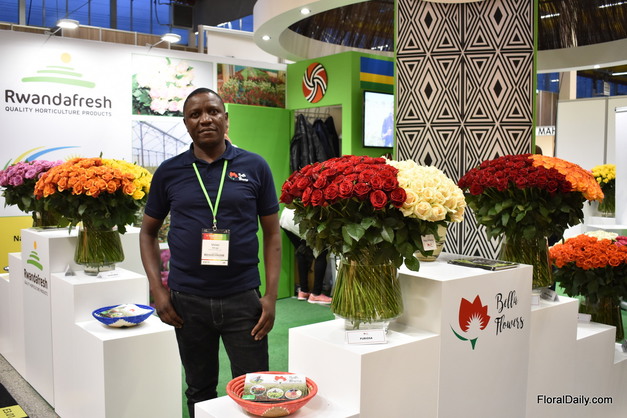Usually, 100,000 stems on average are being produced a day at Rwanda's only rose farm, Bella Flowers. Established in 2016, starting with 20 ha, they quickly grew to 40 ha by the end of 2019, exporting at least 85 percent of their production. In the coming years, plans are even in the pipeline to grow to 60 ha, and to enable this growth, they have set up their own propagation facility. However, now with the COVID-19 situation everything has came to a standstill. They are maintaining the crop and like everyone, they are hoping for better times soon. "We can't wait to pick up from where we left off", says Victor Omuga, Marketing Manager at the farm.
Victor Omuga at the IFTF 2019 in Vijfhuizen, the Netherlands.
Almost no exports
Bella Flowers mainly exports to the Netherlands, and not only in this country volumes had been increasing, also in Australia, the UK and Middle East. Unfortunately, due to the COVID-19 situation, demand started to decrease from mid-March, Omuga tells us. "We saw the orders going down and some were being cancelled." By March 20, everything was more or less completely shut. "Since then, there is more or less no demand for flowers, and airports were largely closed. One time a week, we can send maybe one pallet to the auction in the Netherlands. But this is just to be there, to keep our farm name in the minds of the buyers."
Local demand collapsed
At least 85 percent of the roses used to be exported and around 15 percent was intended for the local market. However, since the Rwandan government advised people to stay at home and prohibited gatherings of people, this market collapsed as well. "Usually, we supplied roses for all kinds of events, but as gatherings are not allowed anymore, we lost about 90% of sales to the local market."
Maintaining and delaying the crop
Currently, the only thing they can do is keeping their crop in good condition so that it will be ready for the times when demand increases. "We are pruning the crop so that we can delay the production of it. In the meantime, we will continue watering, fertilizing, cleaning and so on. By maintaining it, we can keep the quality of the product and be ready when demand will increase."
Plans still in the pipeline
Like everyone, Omuga is looking forward to the days that the situation will stabilize and normalize. And despite the challenging times they are now going through, plans are still in the pipeline. "I am so proud of what our farm has accomplished in just 4 years. We've built up awareness for the Rwandan rose and we were expanding markets and relations quickly. Plans to expand the farm to 60 ha are still in the pipeline, we've even established a propagation facility to enable this expansion. Currently, everything stopped, but as soon the demand starts to rise, we will immediately pick up from where we left off."
On Saturday March 14, Rwanda confirmed its first case of coronavirus in the country. On April 1, the Ministry of Health reported corona cases in the country reached 82.
For more information
Bella Flowers
Victor Omuga
Email: [email protected]
www.bellaflowers.rw

